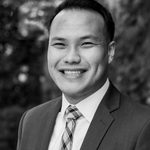
In the November 2021 episode of Discussions with DPIC, Daniel Chen, counsel at the Becket Fund for Religious Liberty, speaks with DPIC Executive Director Robert Dunham about the Supreme Court case Ramirez v. Collier and death-row prisoners’ rights to religious freedom. John Ramirez has challenged Texas’ restrictions on audible prayer and physical touch by his spiritual advisor during his execution. Allowing such pastoral comfort in the execution chamber, Chen says, is about “fundamental human dignity.”
Interviewed a week before the Supreme Court oral argument in Ramirez, Chen describes the Becket Fund’s involvement in that case and others involving the free exercise of religion in the execution chamber. Tracing the history of audible prayer and clergy touch during executions, Chen says Texas’ policy is out of step with historical practices, including its own pre-2019 regulations.
A key issue in Ramirez, Chen says, is whether Texas violated the Religious Land Use and Institutionalized Persons Act (RLIUPA) by prohibiting Ramirez’s pastor from praying audibly and touching him in the execution chamber. Because Texas has conceded that this constitutes a substantial burden on Ramirez’s exercise of religion, the state has the burden of showing that the prohibition is the least restrictive means of advancing a compelling state interest.
“[P]rison security interests are undoubtedly very, very important,” Chen says, but “if there’s a less restrictive way to do it, Texas must do it.” He explains that the historical practices from 16th century England and colonial America through Texas’s own executions in the modern era undermine the state’s assertion that there are no less restrictive means of burdening Ramirez’s rights. “if you’ve been able to do it in the past, you have to be able to come up with some justifiable reason for why you’re departing from that. And Texas here, I believe, hasn’t done that,” Chen says.
Texas’s position, Chen argues in further undermined by the fact that the federal government permitted spiritual advisors to engage in audible prayer during its 2021 – 2021 executions and Alabama permitted Willie B. Smith’s pastor to anoint him with oil, pray out loud, and touch him in an October 2021 execution, all without incident.
Chen and Dunham conclude their discussion exploring the Becket Fund’s belief that the right to religious liberty is a fundamental human. The government must protect that right, Chen says, even — and perhaps especially — “for people who might be different from us, who might have different life circumstances,” including those on death row.
Discussions With DPIC, Daniel Chen of the Becket Fund for Religious Liberty Discusses Freedom of Religion in the Execution Chamber, November 8, 2021



